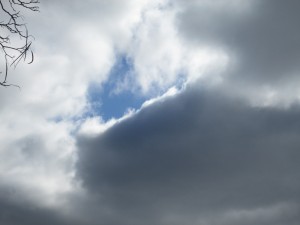
On Friday, David and I took the T to Park Street to join other Quakers at the Good Friday vigil on Boston Common. “Busy about the work of the earth,”* I hadn’t really considered this upcoming event until I caught sight of my reflected self in the T’s window: “Oh, right. I am about to become a Public Quaker. Better get my pious face on.”
And instantly felt, well, sheepish! (Sheepish perfectly describes how I felt—and given the season, is also conveniently pascal, isn’t it!)
Most Good Fridays (and I’ve been showing up for these vigils for over thirty years), standing in a silent line with fifty or sixty other Quakers is holy. But not this year.
This year I felt like a freak show: “Oooh. Look at the real life Quakers!” This year, I felt as if I served as a fleeting distraction for crowds of tourists “entranced by the sight of distant goals.”* (goals, I gloomily surmised, that involved serious SHOPPING.) This year I felt as though I was reluctantly participating in a Quakercentric activity, well-meaning, to be sure, but grossly ineffectual, and more about making me feel righteous than about real witnessing.
Fine, I thought, standing there. If this vigil is, indeed, really about me, let’s use this time effectively: What is it I’m supposed to glean from this?
Lots.
1. Strategy matters. I have shown up—in courtrooms, for example or when visiting legislators—where my mere presence did have an effect. But being a Public Quaker on Good Friday on Boston Common as hundreds of tourists and people on their lunch hour scurry by? Uh uh. NOT effective. Not strategic. (As close readers of this blog will certainly remember [see “Bling”] being strategic is now a huge part of my “What am I asked to do?” discernment.)
2. Only engage. How I wished we could have engaged with the parents and children who walked past us, the children whispering: “What are they doing?” Such wasted, teachable moments. Which leads me to:
3. Engage 2.0: This year’s vigil pamphlet, written by FMC’s Peace and Social Concerns Committee and distributed to passersby, was about gun violence. If we peacemakers want to truly inherit the earth, maybe we ought to be engaging with those with whom we strenuously disagree? Like the NRA?! Now THAT would be real witnessing. (and, yes, as I stood in silence I, of course, remembered Rufus Jones and Hitler. Talk about speaking truth to power!)
And today, this:
4. Rituals matter. This morning I walked into a living room filled with the smell of our Easter lily to instantly remember childhood Easters in Bridgeport, CT at my grandmother Lil’s house, the rituals around dying eggs and lilies and too much candy and getting all dressed up on Sunday morning—another kind of being-public experience. (A self-aware child, I didn’t feel the least bit sheepish about knowing how nice I looked all dressed up!) And realized that for many dear, dear Friends, the Good Friday Vigil is an important ritual which obviously speaks to their condition. So I need to sit down with these good people to discover why they faithfully show up every year.
And then, together, we figure out how to engage with the NRA?
“To arrest, for the space of a breath, the hands busy about the work of the earth, and compel men entranced by the sight of distant goals to glance for a moment at the surrounding vision of form and colour [sic], of sunshine and shadows; to make them pause for a look, for a sigh, for a smile—such is the aim [of a writer], difficult and evanescent, and reserved only for a very few to achieve.” —Joseph Conrad, 1897—










